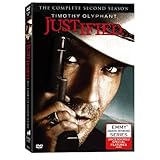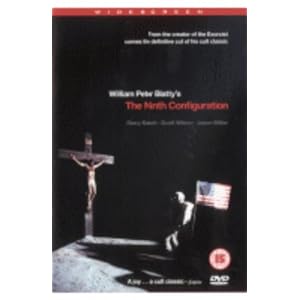
&

Based on an Elmore Leonard short story starring Timothy Olyphant. Good stuff.


Thanks for the recommendation, I have been mulling over getting the first set and the Underwood box set too. I will get the first series so.tweber wrote:Not sure if it's already been mentioned here but I've just finished watching series 1 & 2 of Justified
&
Based on an Elmore Leonard short story starring Timothy Olyphant. Good stuff.
I also watched Still Walking last weekend right before Fatih Akin's extraordinary Head-On and really enjoyed it. Two very different films but equally rewarding. What I remember from Still Walking is the same sense of understatement and of the director allowing events to unfold at a measured pace. The tone throughout is unsentimental, which highlights the emotional impasse between the parents and the eldest surviving son, Ryota, that has developed in the wake of the eldest son's death. (The eldest son, Junpei, saved another boy from drowning but lost his own life in doing so.) Two key scenes have stayed with me. First of all, the sheer awkwardness of the scene in which Yoshio pays a visit to the family home, and then when he leaves, the cruelty with which the rest of the family, except Ryota, mock him. Secondly, later in the film, there is a quietly devastating scene between mother, Toshiko, and Ryota, in which the mother discloses that she looks forward to Yoshio's annual visits for the obvious discomfort that they cause him. She blames Yoshio quite openly for the death of her son and is utterly unrepentant. The emotional distance between parents and son is sad but it is quite clear that, despite the son's visits, they (the parents) have no intention of mending the rupture. A part of them has ossified and become closed off. A truly wonderful film, worthy of comparison to Yasujiro Ozu's films, and I feel that I've only scratched the surface of its subtleties in a single viewing, which is always the mark of a great film.Jared wrote:Hi Paul... great review, and I'm really pleased you enjoyed the film... try 'Still Walking' next; a little more subtle, but portrays the changes in Japanese society over the the past few generations from the traditional patriarchal society, as the culture is immersed in post-war westernised values. It's profound and deeply revealing; one you can watch over again.mcq wrote:Last night, I watched Nobody Knows, a film directed by Hirokazu Koreeda in 2004 and recently recommended to me by Jared. This is a wonderful film, perfectly judged in the understatement of its directorial tone. The (true) story is a heartbreakingly sad one of a family abandoned by their mother and whose eldest sibling, Akira, is forced to support his family single-handedly, yet it is the director's singular achievement that the viewing experience is not an unremittingly bleak one. First of all, he does not judge anybody in this film, least of all the mother. The film is edited very simply to ensure that this is the case and you get the very powerful sense of life unfolding and taking its natural course. There is very little exposition in this film in terms of back story, or any kind of commentary on what we are seeing. Secondly, there is very little music in this film. In many Western films, music can be used as a kind of emotional exploitation, extracting emotional responses from viewers that have not been earned by their director. That is certainly not the case here. Thirdly, the cinematography is breathtaking. Perfectly framed shots, each of which have their own natural rhythm. There is no unnecessary lingering over life's injustices or occasional moments of joy. Some shots are unforgettable, such as the burial scene near the end of the film, when Akira's hands start to shake and his friend, Saki, gently puts her hands over his and holds them until the shaking recedes. And then the next scene finds them returning home by train. No words are exchanged, but the image of their shellshocked faces and begrimed bodies says more, much more, than any words could possibly convey. And the closing scene of the film sees the family walking down a city street away from the camera eye, and then suddenly the youngest, Shigeru, looks back and the screen freezes. It's an extraordinary way to close the film - a snapshot in time. An American film would insist on bringing things to a close, on imposing order on what we have just seen. But there are no clearcut resolutions in life, even death itself is an interruption.
I went to see 'The Artist' today at my local cinema, and I have to say it was extremely well done, and probably well worth a few oscars, if the trinkets mean anything to you..
http://www.imdb.com/title/tt1655442/

Paul, I simply knew you'd enjoy this film, and yes his work does stand up to comparisons with that of Ozu and Mizoguchi. You will want to watch this several times, because there are many quietly subtle layers here. Yes, the annual visits by Yoshio do cause disquiet in the viewer, and it is part of the underlying theme of traditionalism vs modernism. I don't know how this plays out in Irish post-war social history, but I find the similarities with the UK quite striking. The 'make do and mend' post war generation of Churchill, Eden & MacMillan had retreated into an austere pre-war Baldwinian traditionalism which was severely challenged during the mid 60's, and in a more subtle way, you see the strong sense of traditional values in the father played out against a changing world he refuses to accept or come to terms with... it reminds me of the end sequence from Mizoguchi's 'Lady From Musashino', (1952) where you realise that the whole film has been played out against a backdrop of a rapidly expanding Tokyo, which will within a year or two, convert the rural village of Musashino into a suburban district.mcq wrote:I also watched Still Walking last weekend right before Fatih Akin's extraordinary Head-On and really enjoyed it. Two very different films but equally rewarding. What I remember from Still Walking is the same sense of understatement and of the director allowing events to unfold at a measured pace. The tone throughout is unsentimental, which highlights the emotional impasse between the parents and the eldest surviving son, Ryota, that has developed in the wake of the eldest son's death. (The eldest son, Junpei, saved another boy from drowning but lost his own life in doing so.) Two key scenes have stayed with me. First of all, the sheer awkwardness of the scene in which Yoshio pays a visit to the family home, and then when he leaves, the cruelty with which the rest of the family, except Ryota, mock him. Secondly, later in the film, there is a quietly devastating scene between mother, Toshiko, and Ryota, in which the mother discloses that she looks forward to Yoshio's annual visits for the obvious discomfort that they cause him. She blames Yoshio quite openly for the death of her son and is utterly unrepentant. The emotional distance between parents and son is sad but it is quite clear that, despite the son's visits, they (the parents) have no intention of mending the rupture. A part of them has ossified and become closed off. A truly wonderful film, worthy of comparison to Yasujiro Ozu's films, and I feel that I've only scratched the surface of its subtleties in a single viewing, which is always the mark of a great film.

yes Paul, I'd agree. it's an audacious and intelligently made film... a 9/10 from me...mcq wrote:The Edge of Heaven is an intensely powerful experience, Jared, as emotionally resonant as Head-On, and one of those films with which you feel you have a strong personal connection. What strikes me about the film is its sense of compassion, which, after all, is one of the most vital - and sadly all too often elusive - human qualities. I really must dig out my DVD and watch it again. Easily one of the best films I've seen in recent years.
